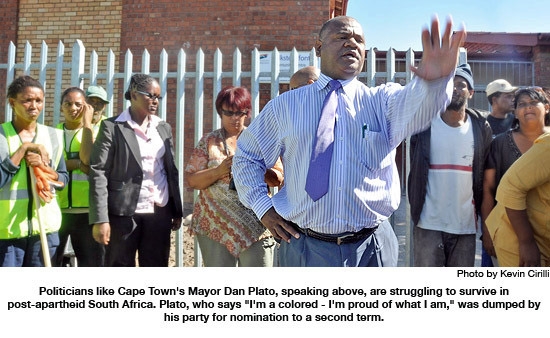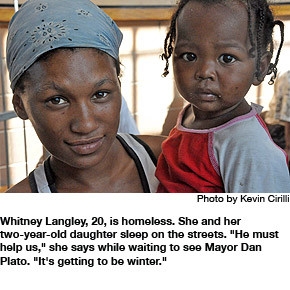Racial harmony remains elusive in South African politics
CAPE TOWN, South Africa -- In the heart of one of South Africa's most impoverished communities -- where dumpster-sized shacks made of scraps of wood, metal and asbestos shingles are typical real estate -- Whitney Langley, 20, held her sick two-year-old daughter and waited in line to meet the mayor.
 But Dan Plato was running late.
But Dan Plato was running late.
In the air-conditioned top floor of the city's Civic Centre, Plato, 50, darted between morning meetings with a black briefcase and newspaper. The headlines screamed the latest national controversy: South Africa President Jacob Zuma's black spokesman was accused of making racist remarks against "coloreds," the name given to the country's mixed race people.
Plato, who is colored, paused to say goodbye to two aides headed for court -- where his political opponents were suing him for civil rights violations. They claim he knowingly installed seat-less toilets in a poor black community. The allegations reinforce stereotypes that his political party, the Democratic Alliance, is racist against blacks.
Incidents like this have dogged Plato during his five-year term, resulting in his party's leadership decision not to select him to run for re-election. In South Africa, race and politics are a double-edged sword.
The predominantly white Democratic Alliance has historical roots in pro-apartheid political parties. As a result, suspicions of racism against its members are not unfounded. But in post-apartheid South Africa, the DA has attempted to expand its base beyond white voters to include coloreds. It has met with success in some places, failure in others, in its quest to become a true opposition party to the ruling African national Congress, dominated by black South Africans.
The Western Cape, the province where Cape Town is located, is one of the DA's strongholds. But it is the only one of the country's nine provinces where the DA holds a majority -- and a slim one at that, with just 51 percent of the vote during the last election.
Racial harmony remains elusive in South Africa, particularly in politics, in the 17 years since the ending of apartheid, when Nelson Mandela walked out of prison and eventually became the country's first black president to end more than a century of white oppression of blacks and coloreds.
Just as in the United States, where increasing partisanship and distrust have gummed up the political system, politicians in South Africa bicker and point fingers. But at the center of the debate is the question of which party is better equipped to improve the lives of citizens -- the black-dominant African National Congress or the white-and-colored-dominated Democratic Alliance. Spawned from the debate are politicians who say they want to be all things to all people.
Plato is one of them.
With two bodyguards, he headed through the lobby past a statue of Nelson Mandela and waited for the elevator to take him to his driver, who would take him to the meeting with Langley and other constituents.
"What a morning," he said.
Across town, 11 miles away, Langley still waited, determined to talk to Plato about housing for the poor.
***
In the seventeen years since Mandela and his African National Congress led the nation to a peaceful victory over the Apartheid regime, South African politics remains deeply divided by race and poverty.
The black population -- 79 percent of the country -- remains connected to the ANC, while whites -- about 10 percent of the population -- comprise the base of the Democratic Alliance. With just 2 percent of the population either Asian or Indian, the colored population -- 9 percent of the people -- has become the big political prize and the group no political leader wants to alienate.
"Race touches every issue in this country," said Justin Sylvester, a political analyst from the Institute for Democracy in Africa, a political think tank in Cape Town that studies African politics. "Race gets used to mobilize support and then politicians turn around and tell South Africans they must move past race."
That is why the comments of President Zuma's spokesman, Jimmy Manyi, caused such an uproar when they surfaced on YouTube.
On the tape, Manyi said coloreds were "over concentrated" and "in oversupply" in the Western Cape, the region where Cape Town is located. While blacks are in the majority in the country as a whole, about 50 percent of the Western Cape's population is colored, with 30 percent black, 18 percent white and the remaining Indian or Asian.
In the apartheid era, coloreds and blacks used to fight side by side against white oppression. Like many other South African politicians, Plato's journey into politics is rooted in rebellion against apartheid. Police shot at him, stoned him, even beat him, he said.
"I'm a colored. I'm proud of what I am and I'm not running away from that. That is my identity," Plato said.
In an interview from his soon-to-be-vacated mayor's office in Cape Town, he continued: "The days of fighting in the trenches are over -- it's time to roll up our sleeves for the new South Africa. I'm carving out the new South Africa," he said. "I spent my younger days challenging the government and today I'm part of it."
***
"Morning, morning," Plato said pushing through the double-doors of a local community center where Langley waited with about 30 others. He headed straight for his office. No air-conditioning here, just a table and chairs. It's Tuesday -- when Plato listens to constituents for an entire day in the ward he also continued to represent on city council. He opens a notebook and tells an assistant he's ready. One by one, the mayor hears their stories.
 Langley is homeless. Vandals tore down her shack. Now she and her daughter sleep on the streets, home to gangs, spiders and snakes.
Langley is homeless. Vandals tore down her shack. Now she and her daughter sleep on the streets, home to gangs, spiders and snakes.
"He must help us," she said. "It's getting to be winter."
They want housing and jobs. And they want answers about why they don't have either. Each time, Plato writes in his notebook, which he'll pass off to an aide. What action will be taken is never stated. Solutions remain elusive.
"Sometimes the only thing you can give them is hope," Plato said. "If people don't have hope, they don't have anything."
That Tuesday, Plato visited communities where coloreds are the majority. Later in the week, he'd launch his Clean Up Campaign -- a program to educate people about the importance of keeping streets clean -- in visits to three other colored townships, the poor communities on the outskirts of Cape Town. His aides said more visits to black communities were scheduled.
"Dan Plato will promise all of these people, but he won't follow up -- their spirit gets broken," said Reinard Luddick, a veteran South African political journalist. "People don't have basic, basic, basic needs: jobs, service, water, bread on the table. You need to go into the community and put a toilet that has a door."
Plato's aides argued that is just what he is doing, chipping away at overwhelming economic circumstances. Twenty-three percent of South African workers are unemployed, including thousands in Plato's townships in Cape Town.
In March, he created about 30 jobs that lasted a month and paid $93. The workers cleaned the streets, recycled and picked up trash.
During a visit to Kalksteenfontein, where he talked about those jobs, Plato had an audience of adults and children, who lined a school yard's barbed-wired fence to hear him.
"It took a little bit of time, but I'm back," he told the people. "We won't be able to give each and every person a job, but a couple of people will. At least you will be able to put bread on the table."
"It is not the city of Cape Town's duty to give each person a job -- but service delivery is," he added.
From the back of the crowd, an angry constituent shouted that no one ever followed up with her from when he took her name. Another shouted: "We've got one hell of a sewage problem."
"What's your name?" Plato asked. An aide took out the notebook to record Phaldie Manuel's, story. Manuel, 49, said Plato's promises of improving the town's sewage system had not been followed through.
Verania Niemandt, 27, also had a story. Gangsters shot and killed her boyfriend when she was five months pregnant.
Now she's struggling, caring for two children and her elderly mother. Niemandt, who is colored, wanted to know if blacks would be taking her job at the local shirt factory.
During apartheid, these sentiments were called Swaart Gevaar -- Black Danger. Some political experts said the Democratic Alliance is raising that notion, hoping to cement colored support -- and keep coloreds from voting for the ANC
"It's a very dangerous political game. It means Africans will steal colored jobs -- it's a strategy of divide and rule," said Mothabo Moloto, head of ANC media communications.
Niemandt said she believes that only the DA can preserve her job and protect coloreds from being treated as they were during apartheid.
"If the ANC gets the Western Cape, there will be no jobs for us. For them, it's always the black people first," said Niemandt. "I'm struggling and that's when I remember. Would it be different if [the end of apartheid] hadn't happened at all? Would it be different for our children?"
***
About seven miles offshore on Robben Island, Kgotso Ntsoelengoe also remembered apartheid. The apartheid regime imprisoned him on the island -- the same prison where Mandela spent 18 years.
Ntsoelengoe, who is black, has been a tour guide at the infamous prison since 2003, when he returned to the island because he couldn't find employment. He and his family live on the island with the other tour guides.
After an afternoon tour, he chased a white coach tour bus -- the words Driven by Freedom etched on its side -- headed in the wrong direction.
"This is absolutely important for the world to understand and appreciate," he said after one tour, wiping sweat from his bald head.
Unlike Mandela, Ntsoelengoe didn't have his own cell. Instead he was crammed into a rectangular room half the size of a basketball court with dozens of other prisoners. No beds. He slept on the floor.
"It was a dark tunnel with no light at the end of it," he told a group of tourists.
To pass the time, the prisoners played soccer, tutored each other and talked politics. It's the latter topic that Ntsoelengoe said provided the most heated debates.
Decades later, his political beliefs remain deeply influenced by his past, and political debate, although on a different setting, remain just as heated.
"The DA will always look after the white interests. But for them to amount to anything, they need blacks," he said.
Sylvester, the political analyst, said the younger black voters have become increasingly disenfranchised with the ANC.
"The ANC is seen as liberators, but the currency of that is getting weaker every year," Sylvester said.
He said that 20 percent of South African voters are not affiliated with either the ANC or the DA.
"If you're a young unemployed South African -- you might sit and think democracy hasn't given me anything," Sylvester said. "If you don't have a stake in democracy, why the hell are you going to defend it?"
Sitting inside his mayor's office lounge, Plato looked out the window at Table Mountain, part of the majestic range that hugs Cape Town. For many, he was a symbol for coloreds across the nation. Yet amid the toilet-seat allegations, his reputation took a hit. Critics said he became mayor only because he was colored.
"I'm not a puppet. I'm not a window dresser -- I'm a seasoned politician," he said.
Nevertheless, his party's leadership -- led by Helen Zille, a fierce middle-aged white woman who draws comparisons to Hillary Clinton -- did not nominate him to seek a second term. For Plato, who said his legacy includes the local successes of the FIFA World Cup and community education programs at a grassroots level, it's a sign that political opponents succeeded in attacking his character.
The DA is hoping its new candidate will further help expand their agenda. It tapped a colored candidate that appeals to an even larger base: she's a woman. Patricia de Lille used to lead the Independent Democrats party before it folded into the DA in January. She's the new hope for the party, but some are already saying she's being exploited for the color of her skin.
"They're using her in order to color themselves," said Zahida Sirkhotte, 55, a colored woman who is a librarian at South Africa's First National Library.
She blames politicians in part for separating coloreds from blacks.
"Colored was a term we hated - we wanted to be black," she said. "I never considered myself to be colored. I considered myself black."
But after apartheid ended, Cape Town grew economically while the rest of South Africa saw little or no economic change. Soon, blacks were migrating south by the thousands. Politicians played into the fears of the coloreds that blacks would steal their jobs -- or that blacks were preventing them from getting jobs in the first place. In attempts to integrate blacks into positions of power, the ANC implemented affirmative action policies that further played into the coloreds' and whites' fears.
"Now you get black nationalism as opposed to white nationalism. The ANC will be considered a regime," said Joe Schaeffers, who grew up in a part of Cape Town known as District Six during apartheid. "Within our own structure, people are becoming dictators."
District Six was one of the most integrated parts of Cape Town before the apartheid regime forcefully removed non-white people, sent them into the townships and bulldozed the neighborhood.
"The draconian laws are gone, but it's the application of it. We have the best constitution in the world -- but our democracy is a drop in the ocean as far as democracies go," he said. "People say stupid remarks, which fuels the fire of racism. The politicians are very much a part of that."
Political analyst Sylvester said that the real test of South Africa's democracy will come when the ANC loses its power. Because of the racialized political climate, he said he doesn't expect that to happen for at least 10 years. Plato said that intense discussion about race can lead to positive change.
"Racial divides are across the world -- even in China and America," Plato said. "We must talk about racism. It puts the racial debate on the radar until we overcome all racial divides."








